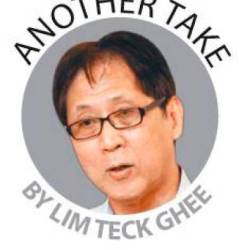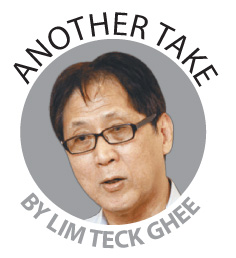IT is safe to say that public disillusionment with politicians and political parties has reached an all time low.
It is necessary to take a step back to remind ourselves that not all is lost.
There have been honorable and decent men and women of integrity who have served the country well.
Perhaps not many, but certainly more than a few. They engaged in politics not for power, wealth, titles and perks. They became politicians for a higher calling – to build a progressive nation that all can be proud of, and to stand for the equal rights and freedoms of all people who call this country their home.
As succinctly noted by a politician recently: “We don’t play games with public office, we cherish and honour the opportunity to serve and do good.”
One such politician little remembered today needs to be brought back to attention especially for his integrity and firm belief that non-communal parties hold the key to the future wellbeing of the country.
He is Dato Panglima Bukit Gantang Datuk Seri Abdul Wahab bin Tok Muda Abdul Aziz who lived in a more tumultuous time. But he kept faith in the necessity of non-communal politics and political parties if the nation was to prosper.
When I mentioned his name at two lunches a few days ago, only two of the group of 20 friends had heard of him – the first, because the road fronting his school in Perak, St Michael’s Institution, bears this illustrious leader’s name; and the other friend, more vaguely.
Less known and less kindly dealt with in history books, Abdul Wahab was of prominent Perak Malay heritage. He had inherited his title from his grandfather. But he earned his standing in society through his own work and accomplishments. He was the first Malay lawyer in the country to be called to the English Bar in 1930.
With his legal firm and hereditary title, Abdul Wahab could have remained rich, comfortable and unconcerned or disconnected from the rest of society to enjoy all the trappings of wealth, position and privilege that accrued to the Malay aristocracy and professional elite of his day.
But he did not do this. Instead he used his training and profession to champion the advancement of the Malay community, especially in the economic sphere that he saw as important to their development.
A fearless Malay nationalist who stood with Dato Onn Jaafar against the Malayan Union, he established the Perikatan Melayu Perak to spearhead the state’s opposition against the Union on Jan 27, 1946.
Although an Umno party member, Abdul Wahab was also a strong critic of the Umno-MCA cooperation, which led to his expulsion from the party in April 1953.
Abdul Wahab was a pioneering Malay nationalist who pushed for economic parity of the Malays and non-Malays. But he was also a visionary who fought for the rights of others.
In a landmark speech at Lahat, he argued: “I ask you not to think that the acts of Government are confined to certain racial groups. I ask you also not to think of your own particular racial group. (The Government) ... is also the responsibility of other racial groups in this country and the public service must be opened to all racial groups”.
This led to his formation of the non-communal National Association of Perak (NAP) in October that year. An observer of that time noted of the NAP: “This is the first time that people of different races have got together to form a non-communal political association”.
To back his belief in non-communal politics and political parties as the right way forward, Abdul Wahab introduced a motion in the Perak State Legislative Assembly to ban communal political parties from participating in municipal and town council elections in the state.
Abdul Wahab was ultimately unsuccessful in his quest for non-communal politics in Perak and Malaya, although he continued to play a prominent role in our journey to independence as representative of the Perak sultan in the independence negotiation team to London led by Tunku Abdul Rahman in 1956.
In 2015 an admirer paying tribute to this founding father noted:
When I was working at the District Office Kuala Kangsar in the mid-1950s, I saw a directive he issued to all district officers instructing them to avoid places of worship when acquiring land for public purposes. The decision reflected maturity and his deep concern for the people of various races who professed different religions.
His untimely death in 1959 at a relatively young age robbed the nation of a model political leader of integrity standing for the rights of all citizens and a passionate advocate for the dismantling of the communal party system and its toxic blend of race and religious politics.
It is not too late for political leaders and parties to learn from Abdul Wahab’s noble life and deeds; and to distinguish between those leaders with clay feet and the real paragons of our political history such as the Tunku, Onn Jaafar, Tun Dr Ismail and the less remembered Dato Panglima Bukit Gantang Abdul Wahab.
Lim Teck Ghee’s Another Take is aimed at demystifying social orthodoxy. Comments: letters@thesundaily.com











